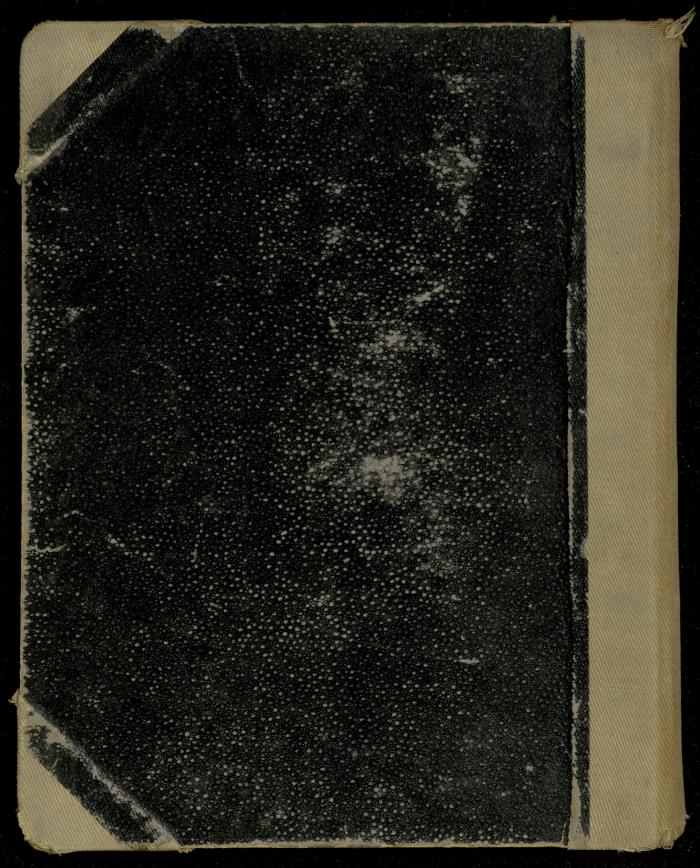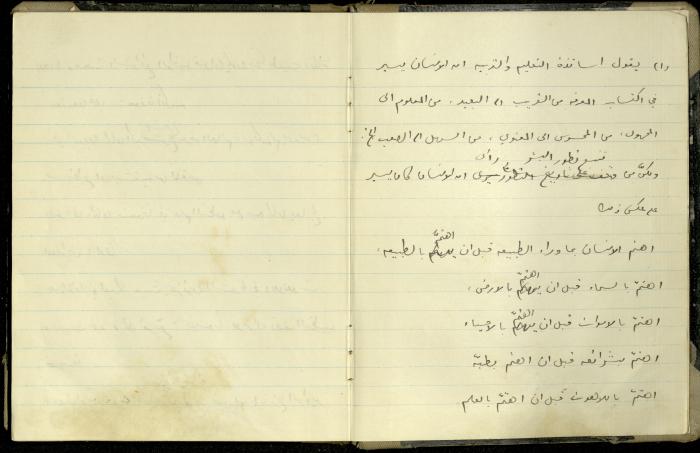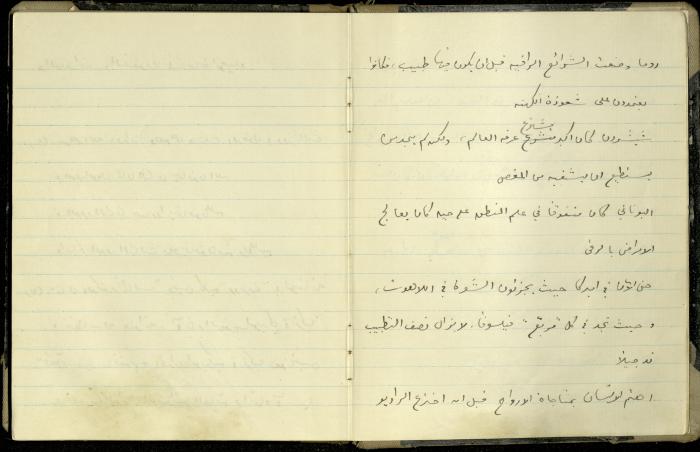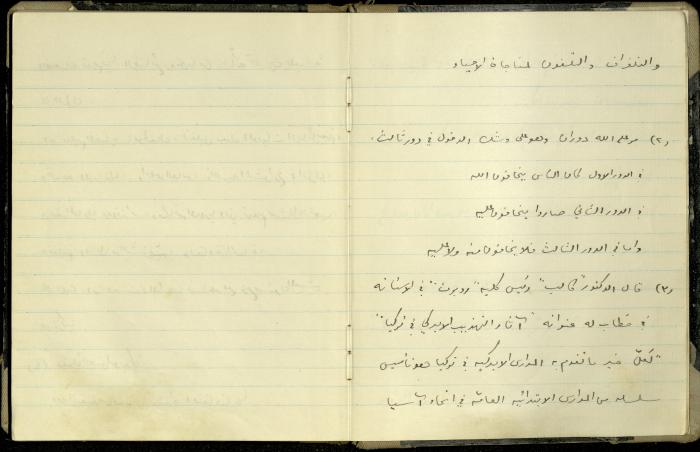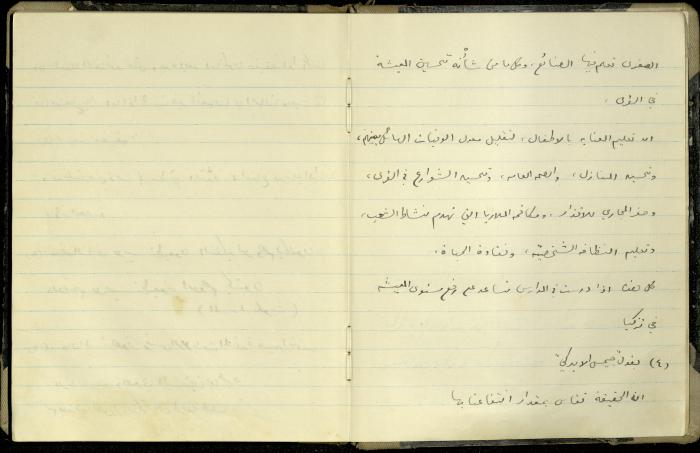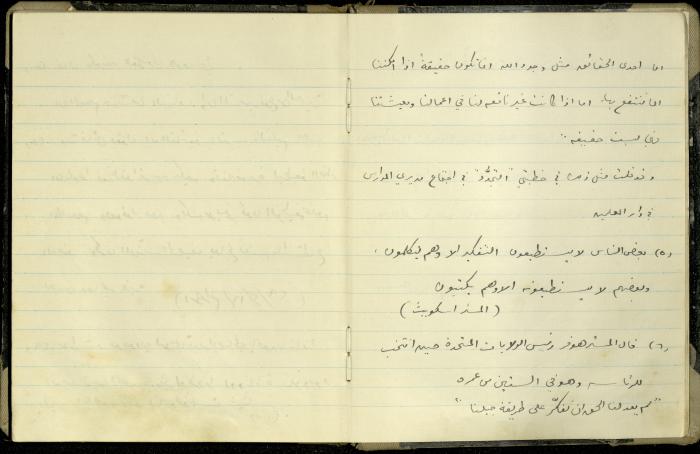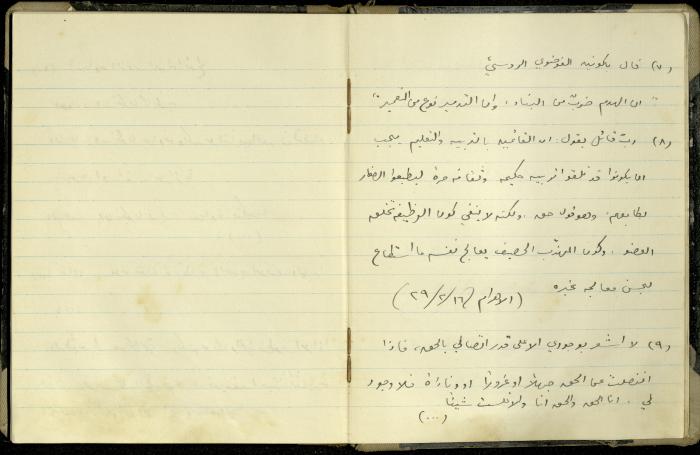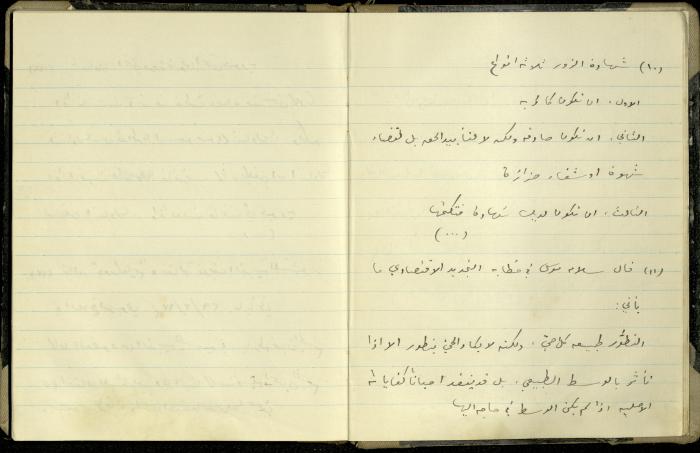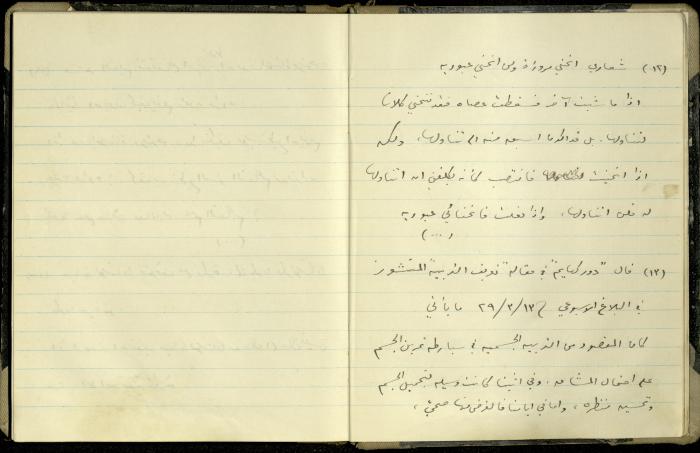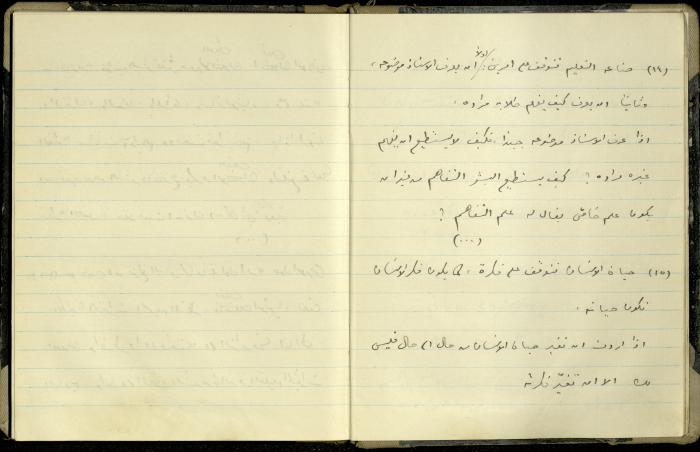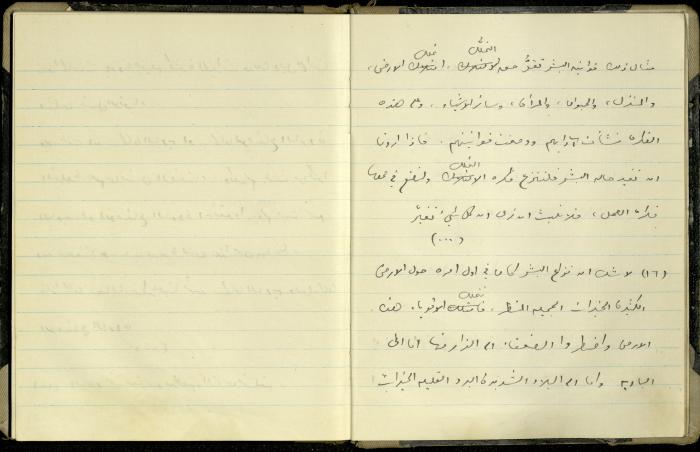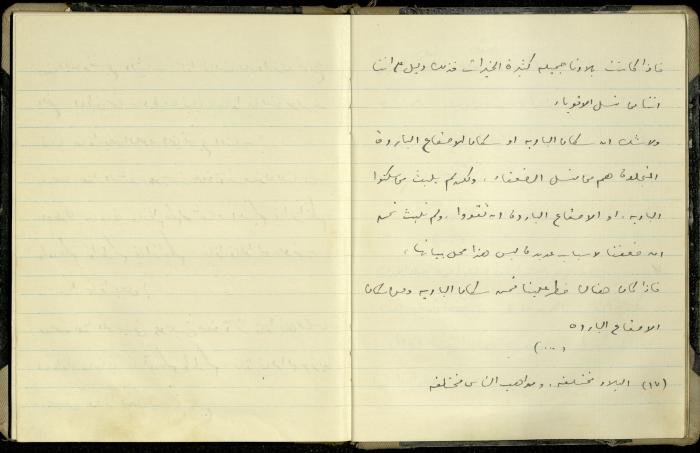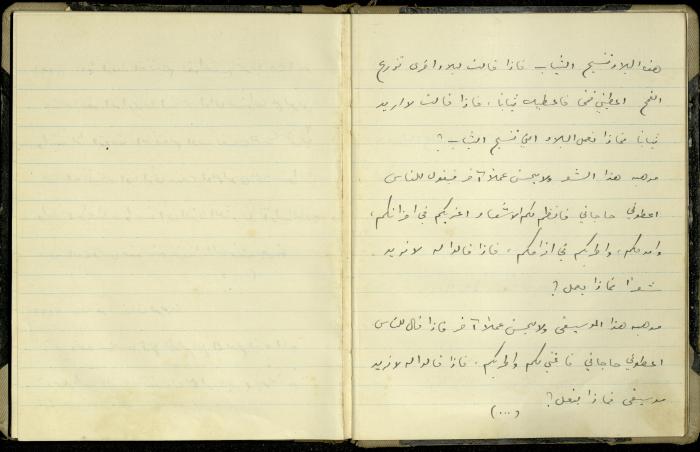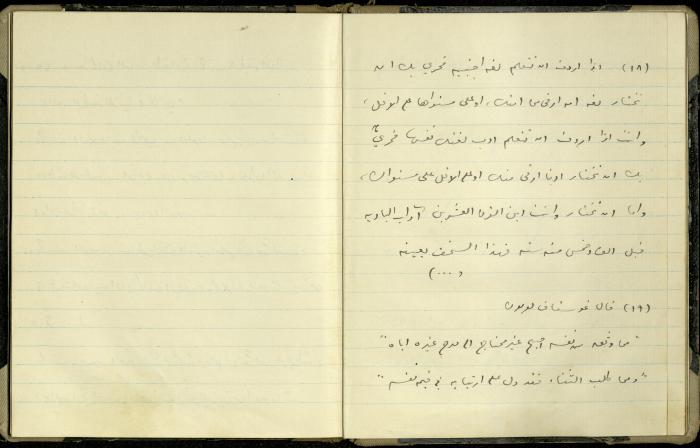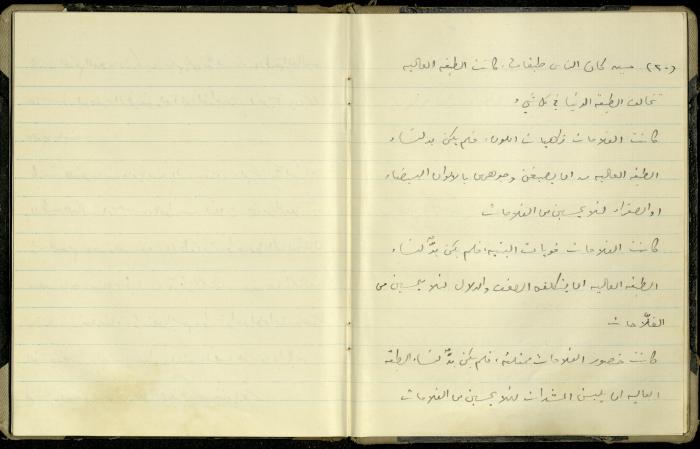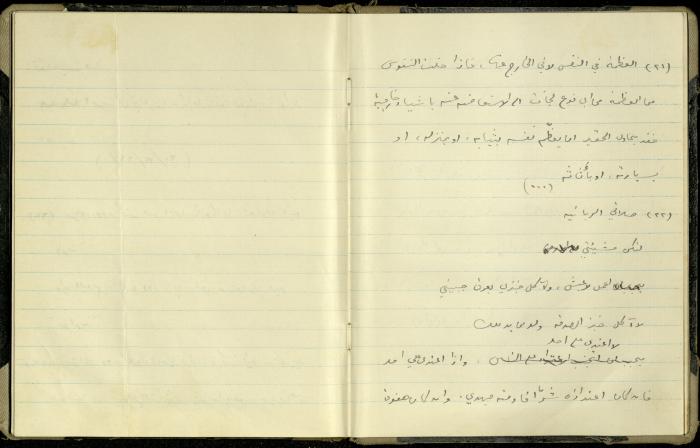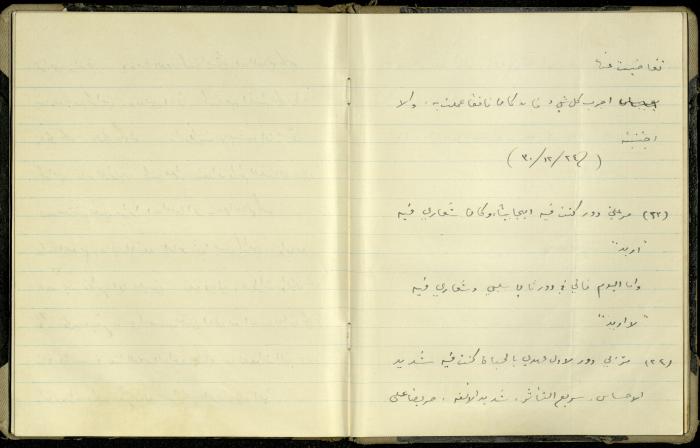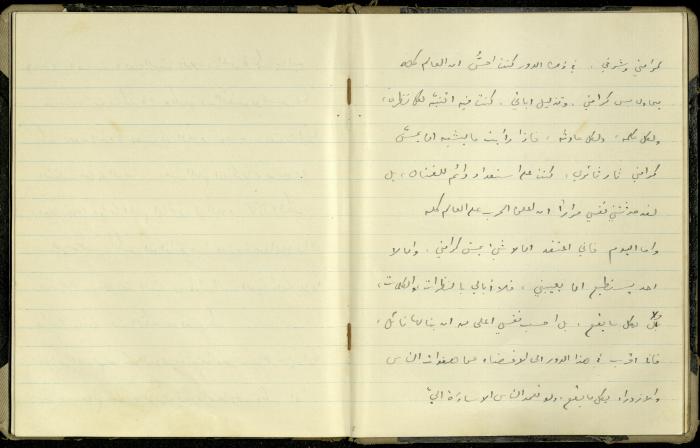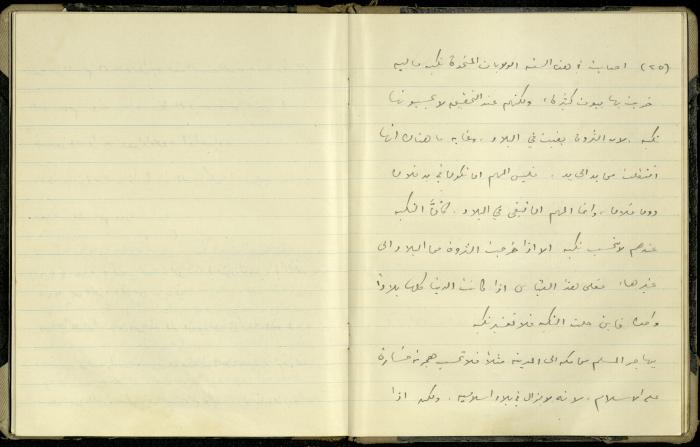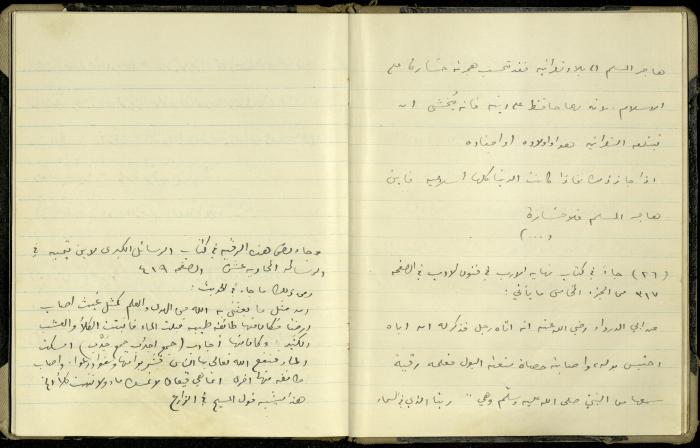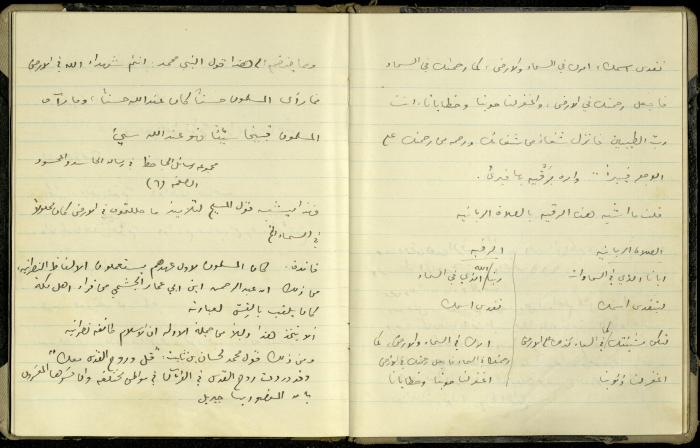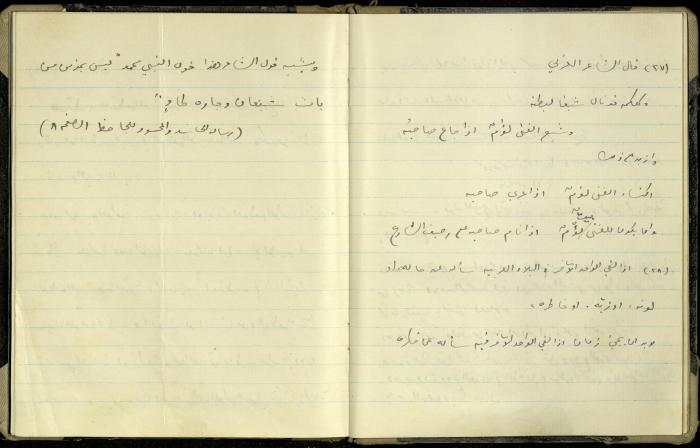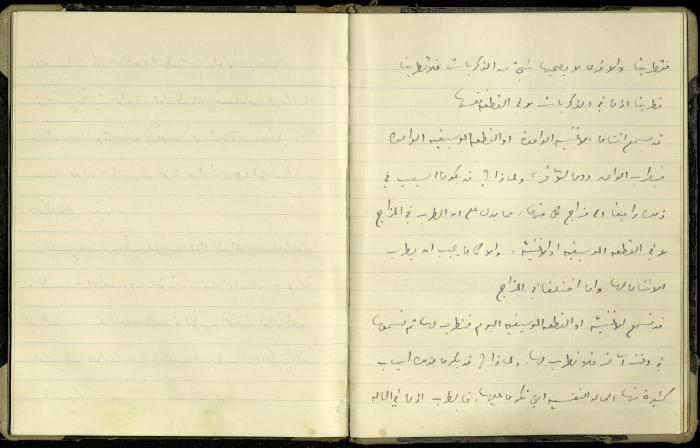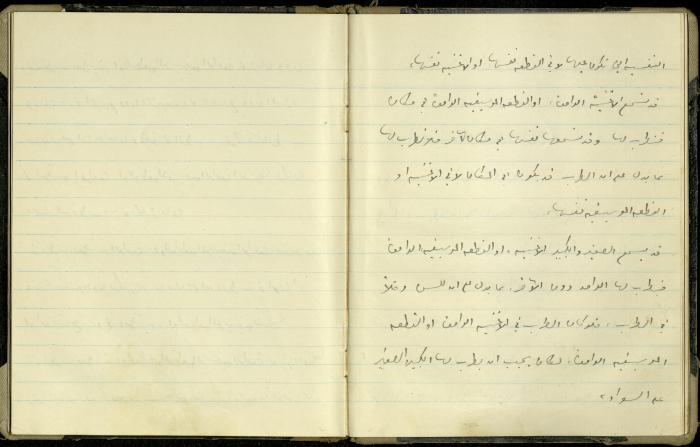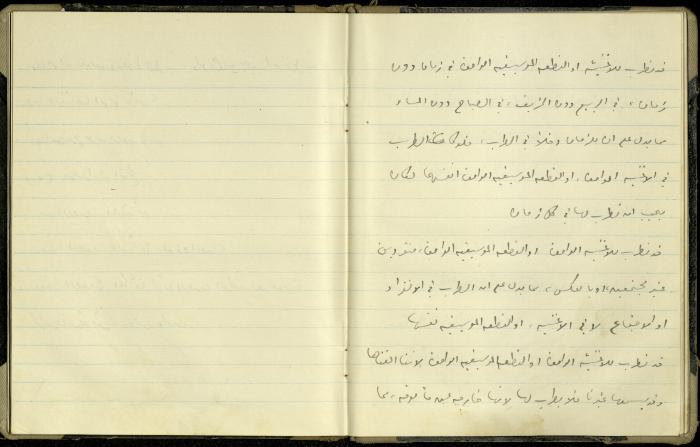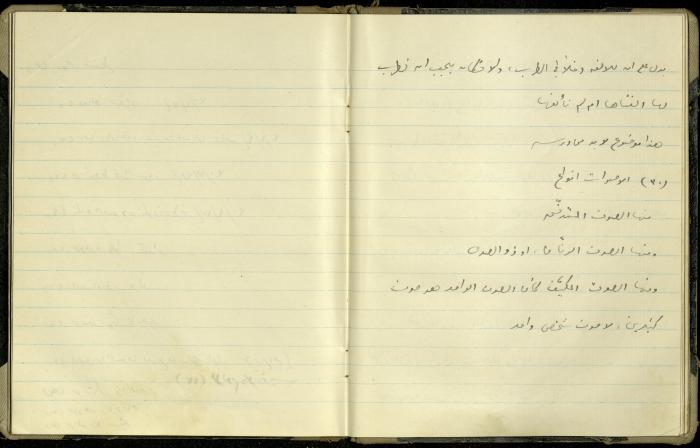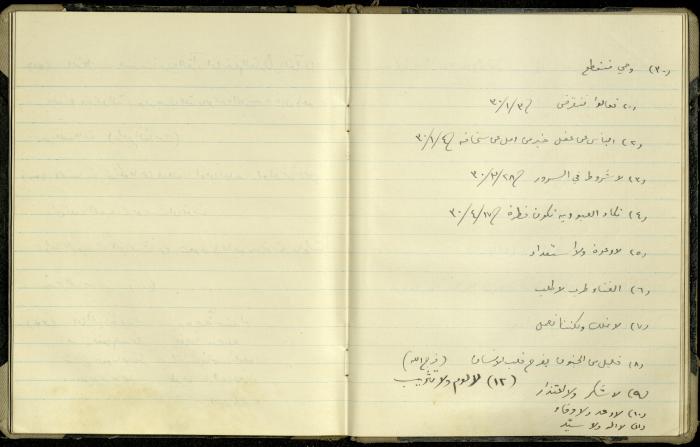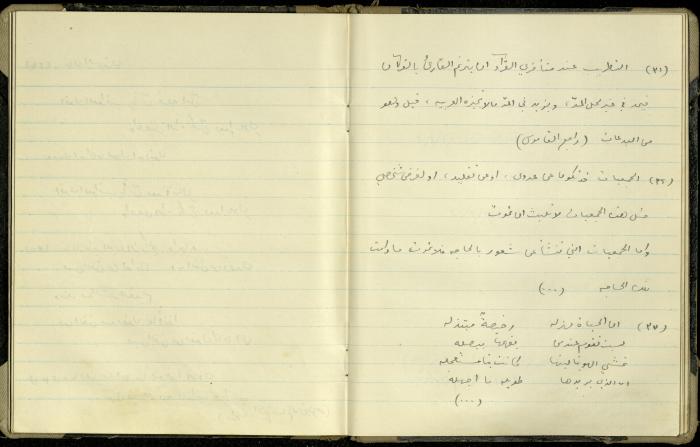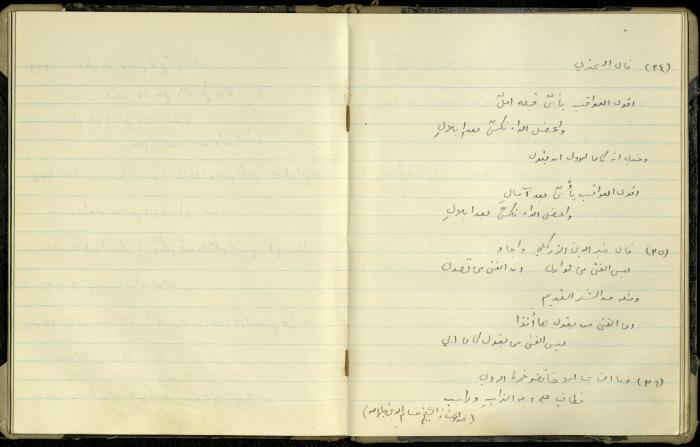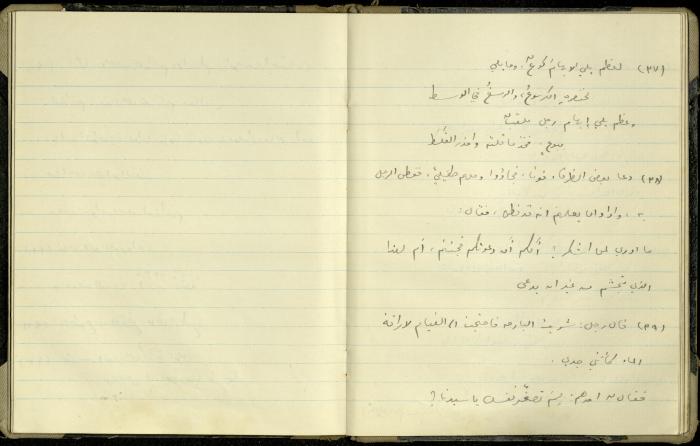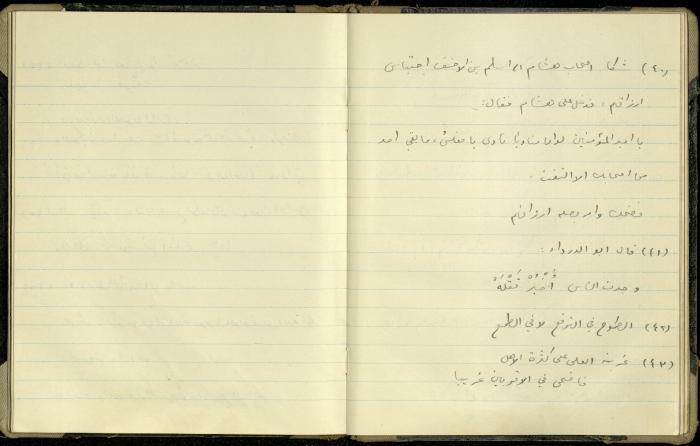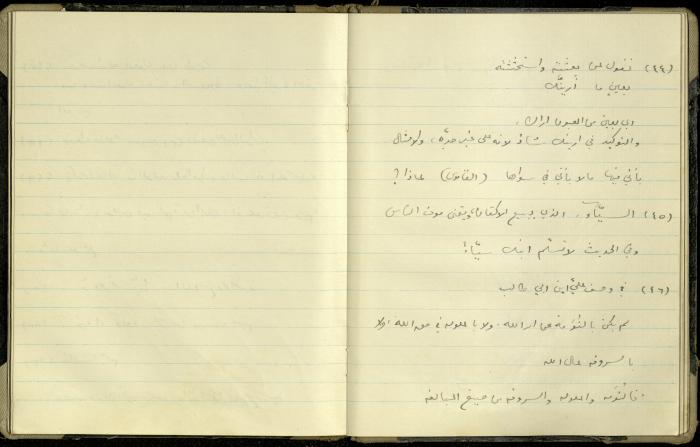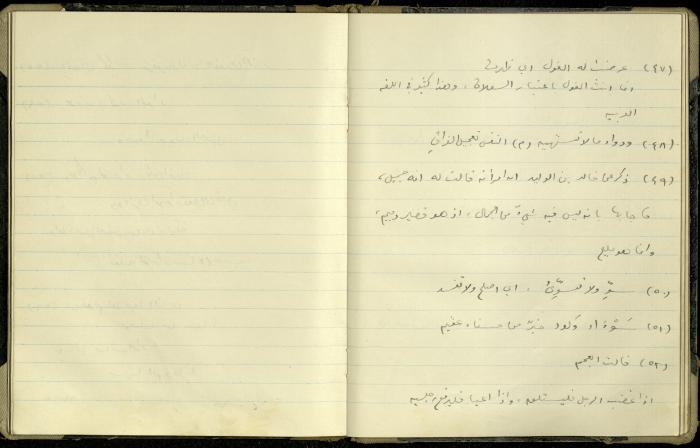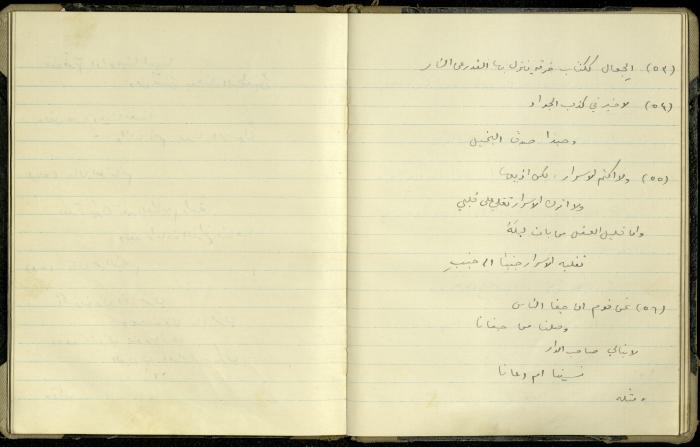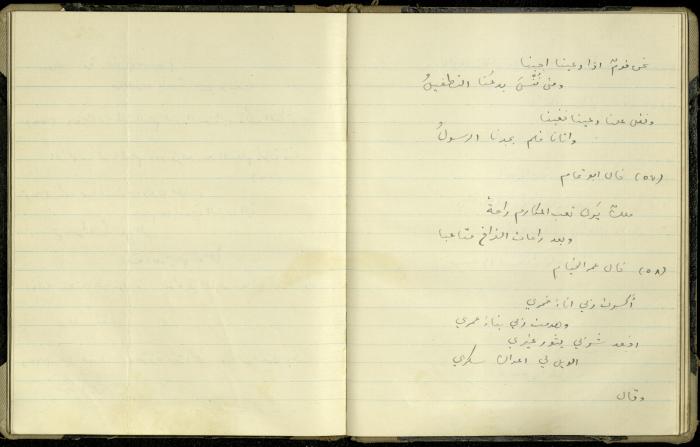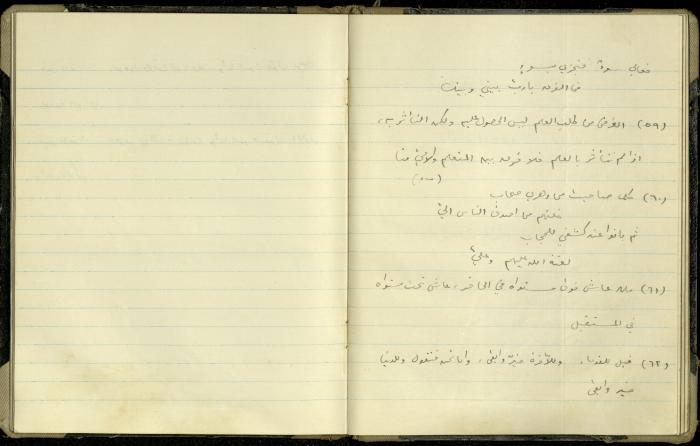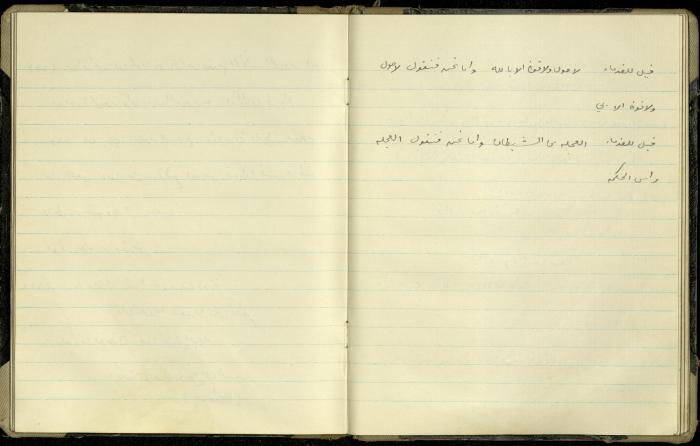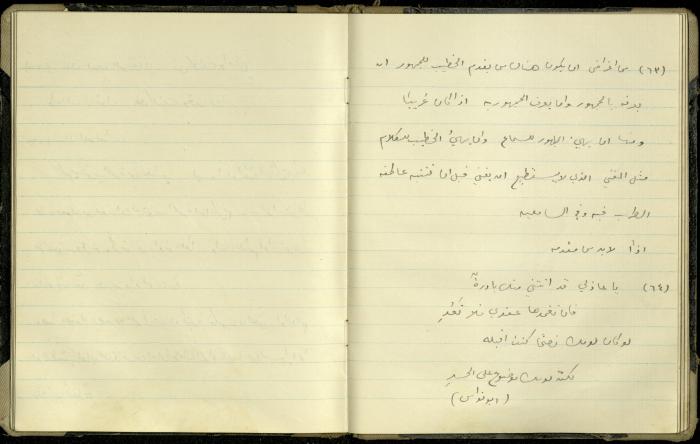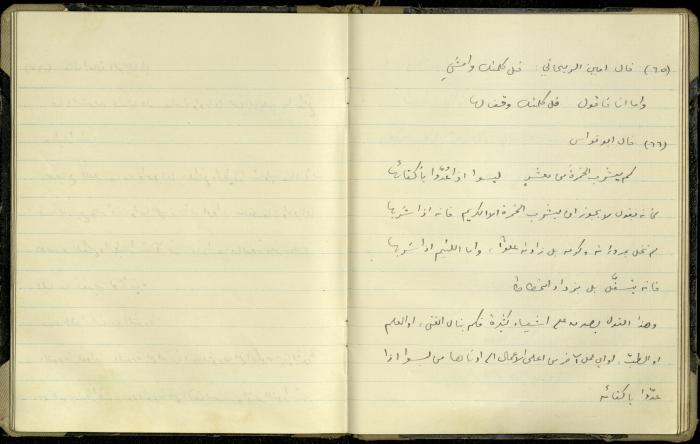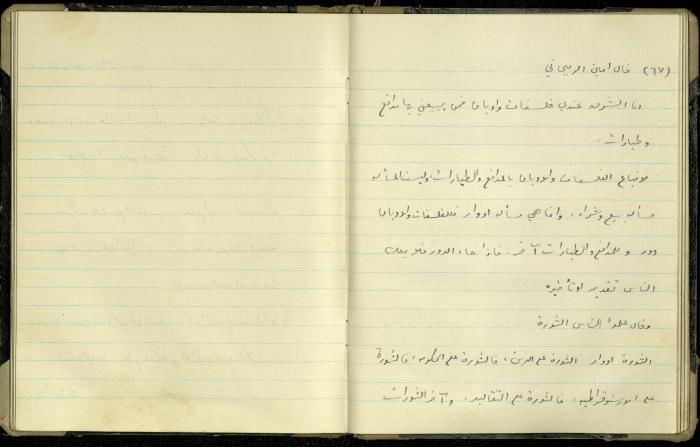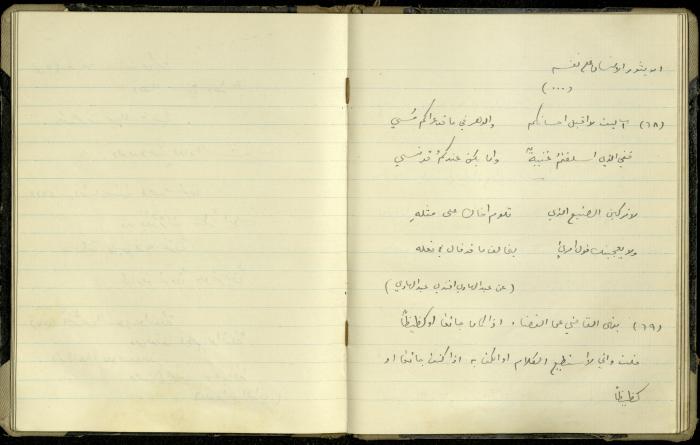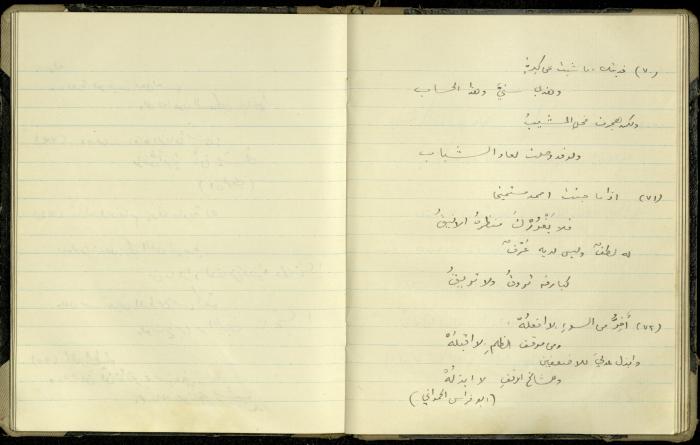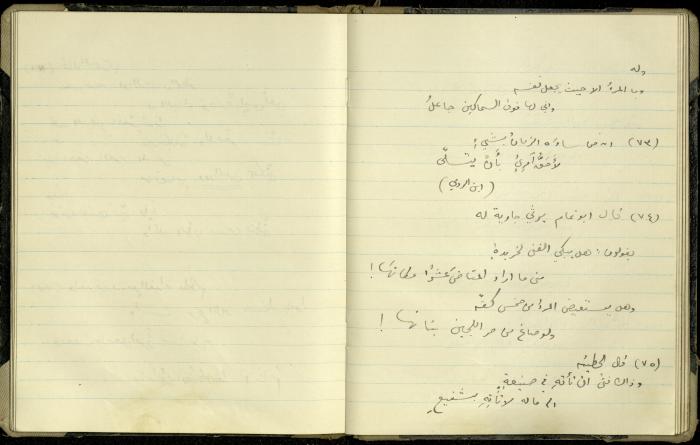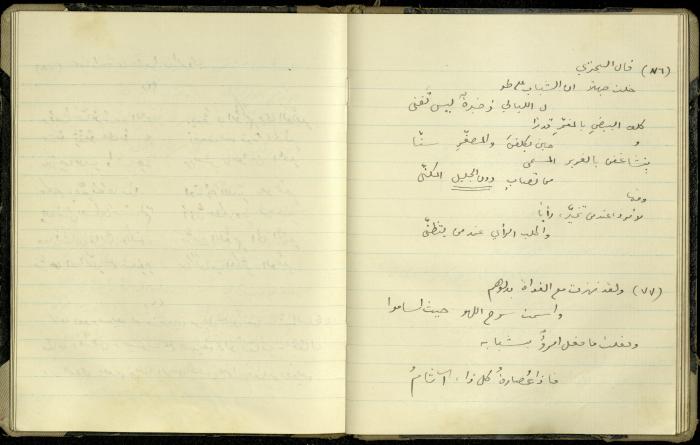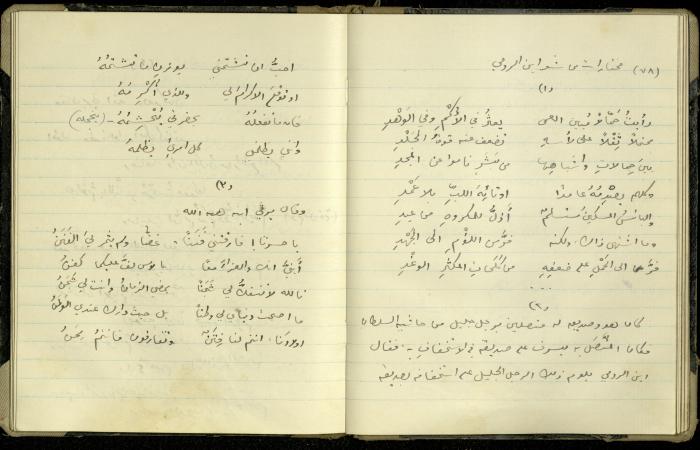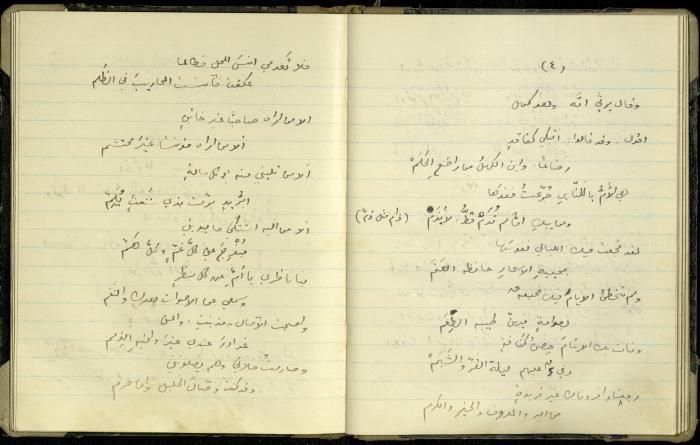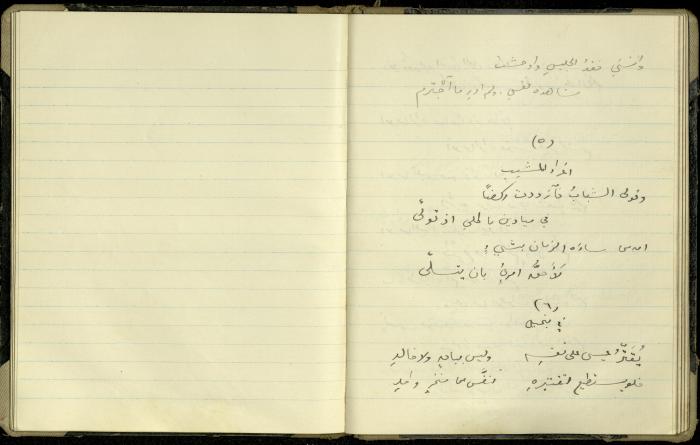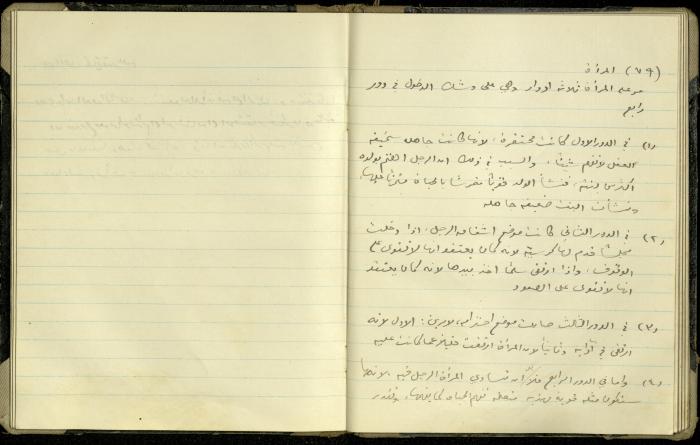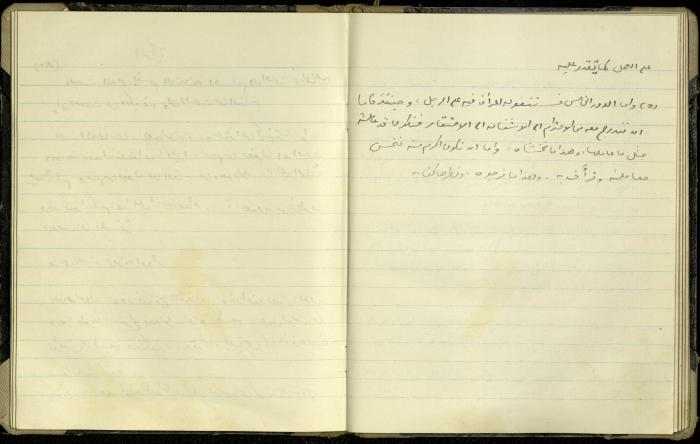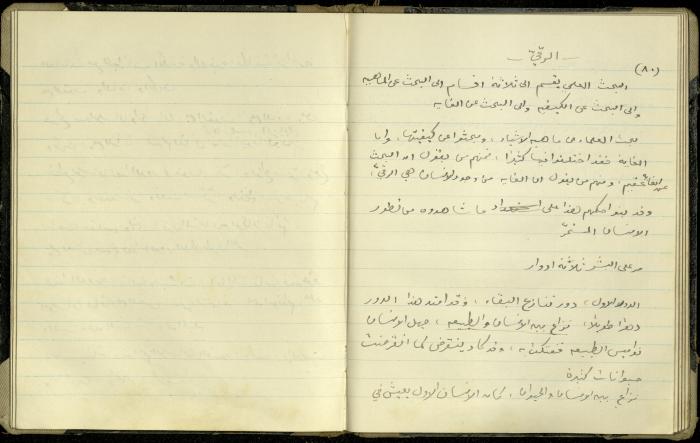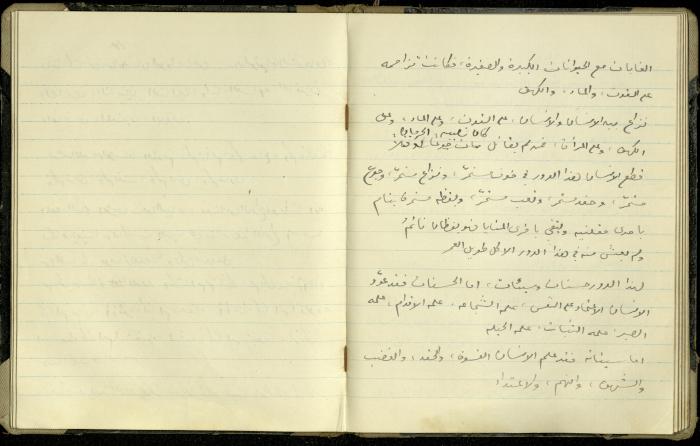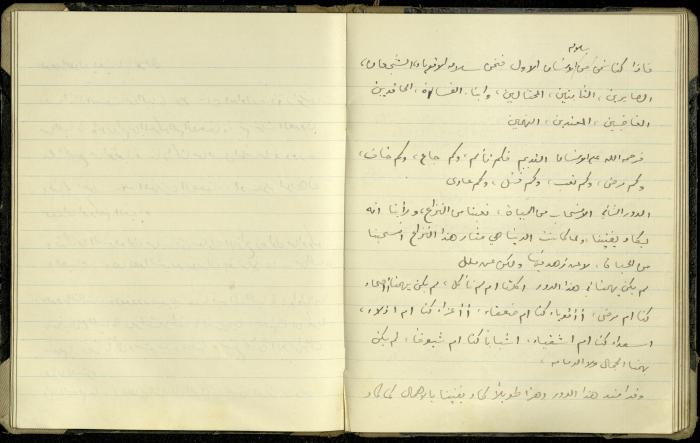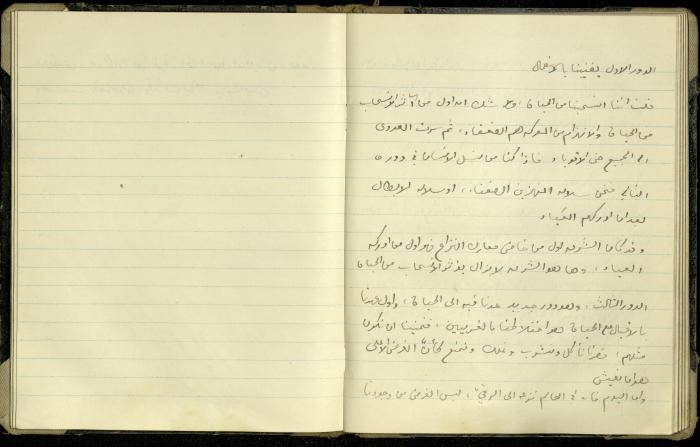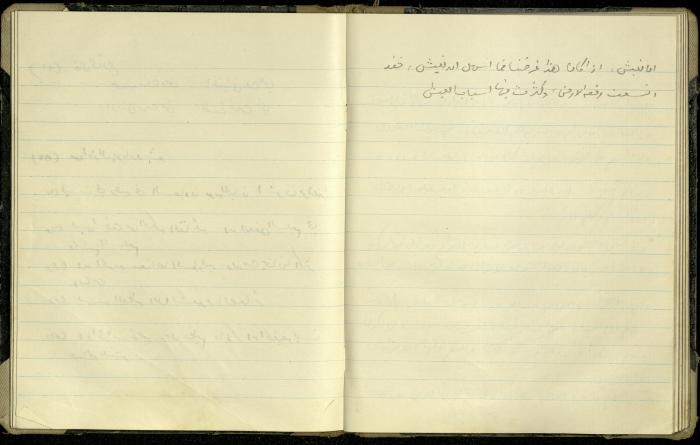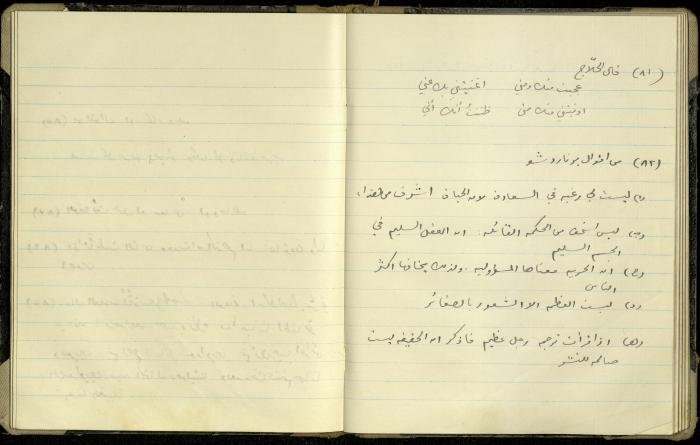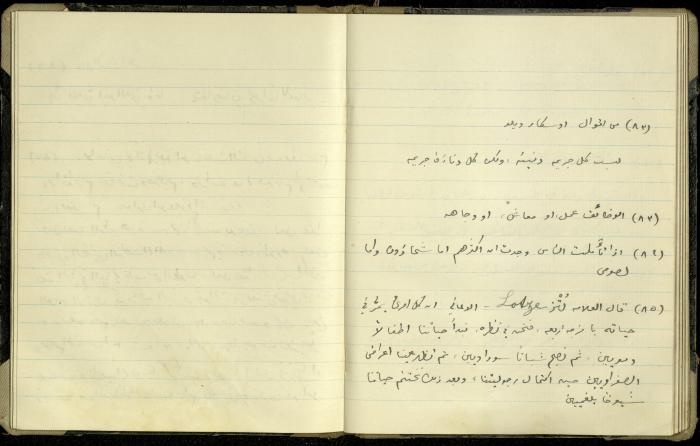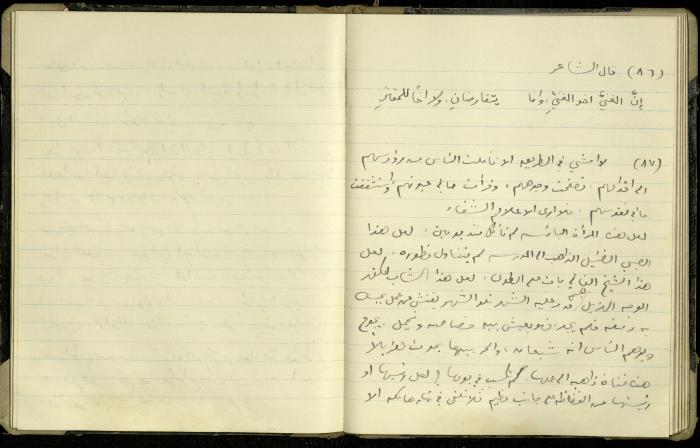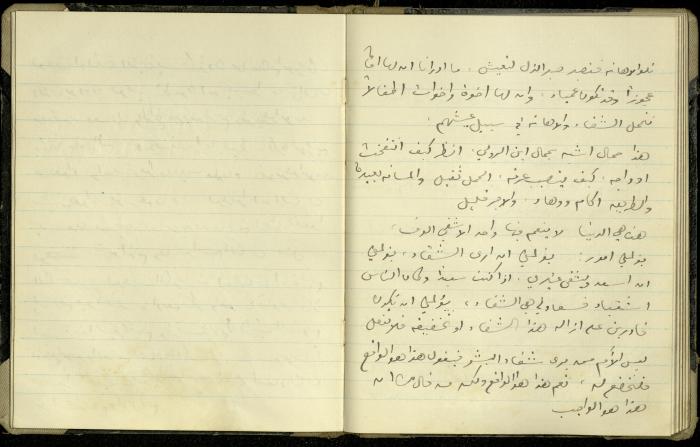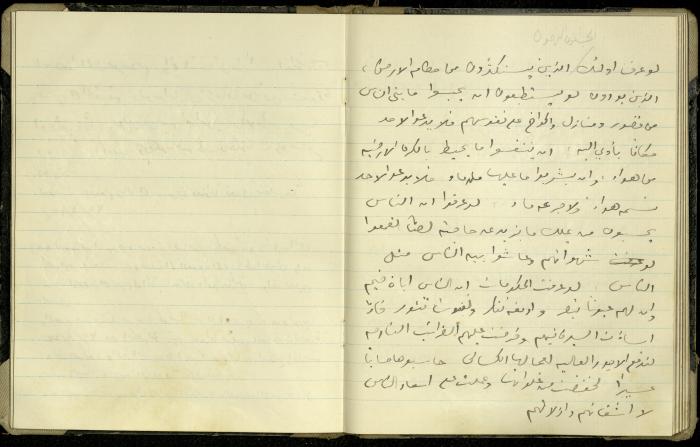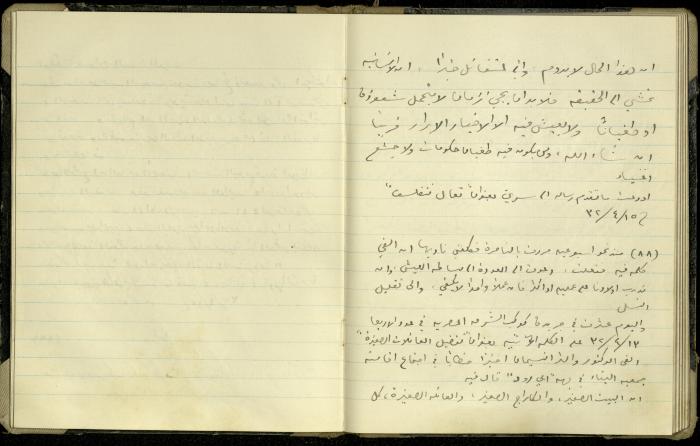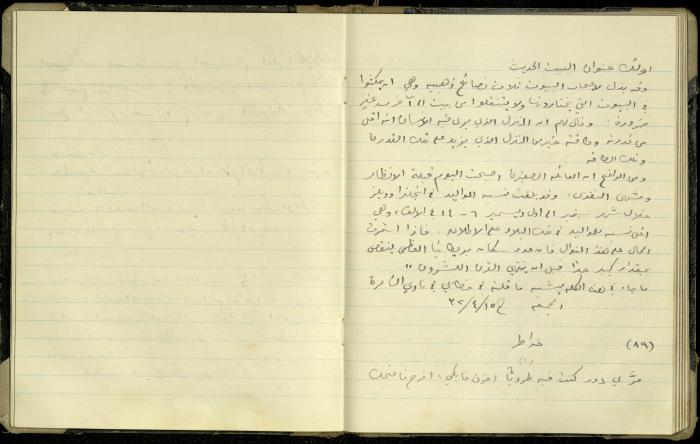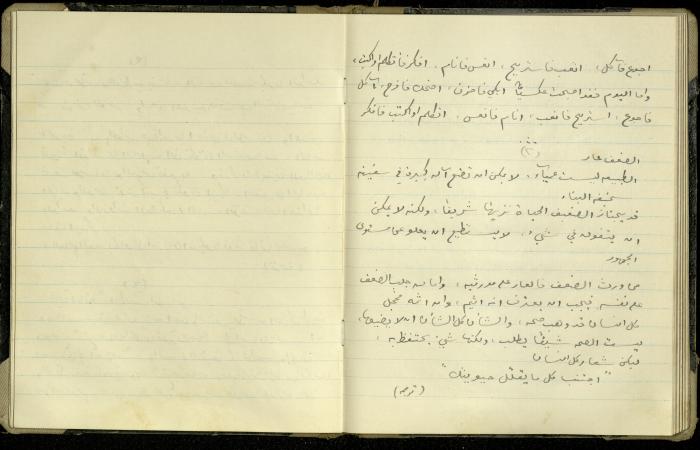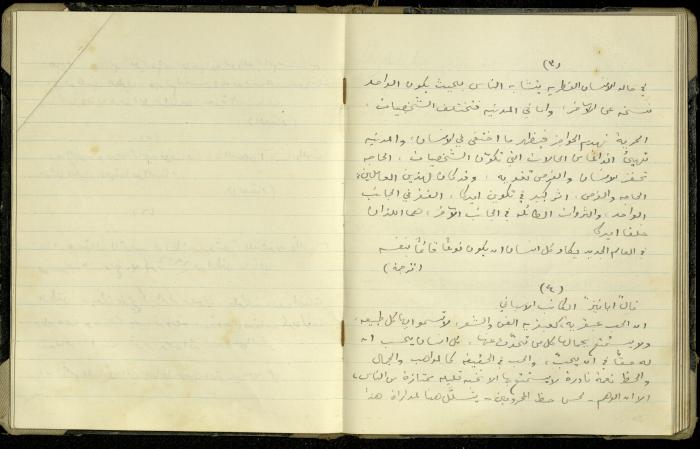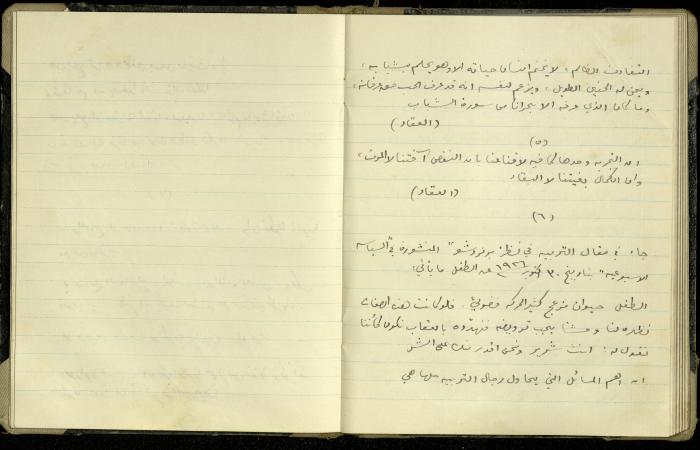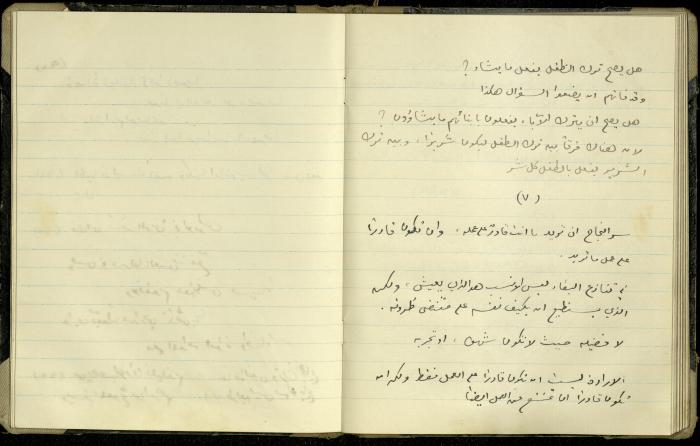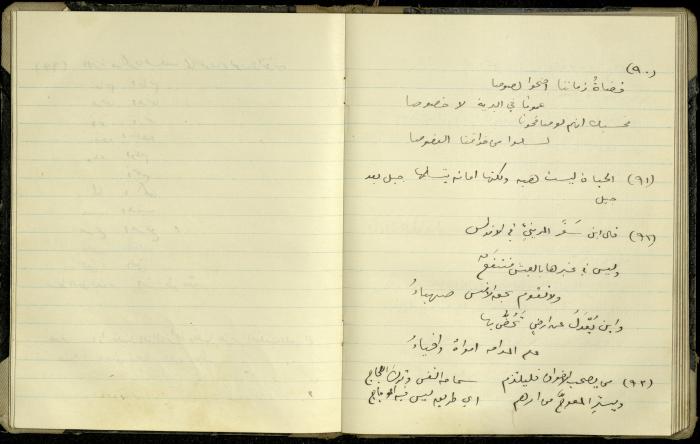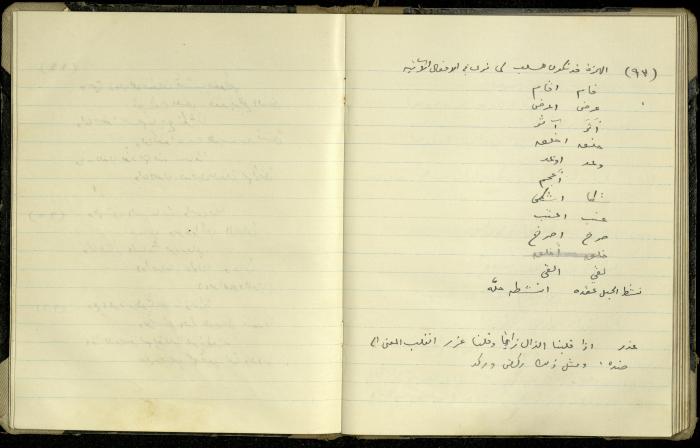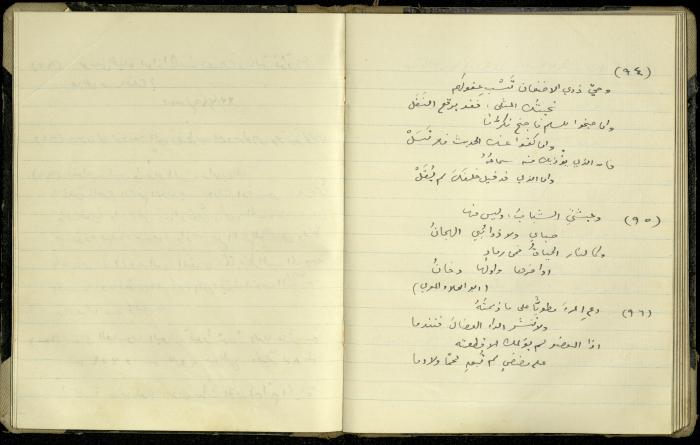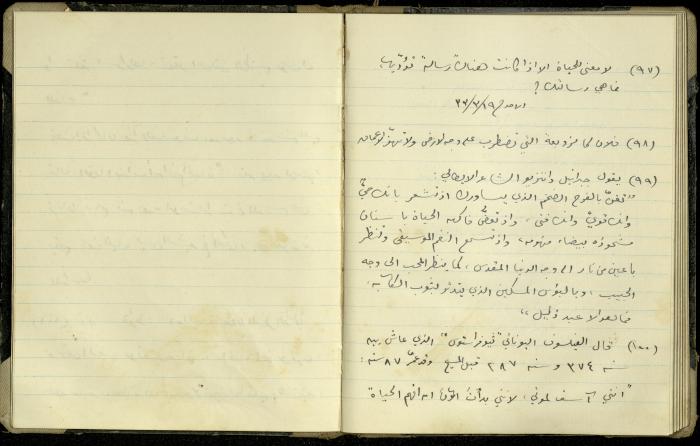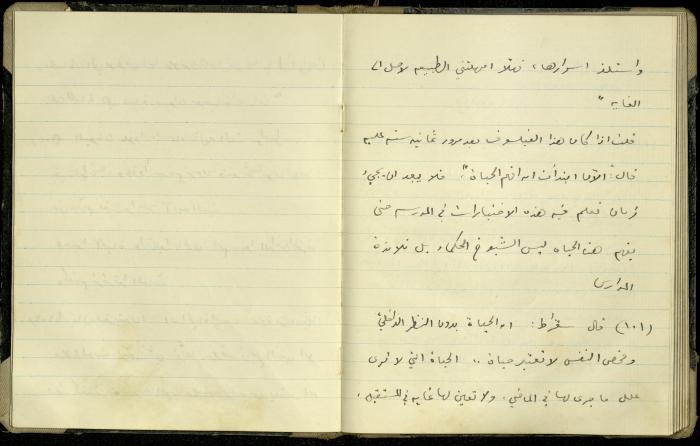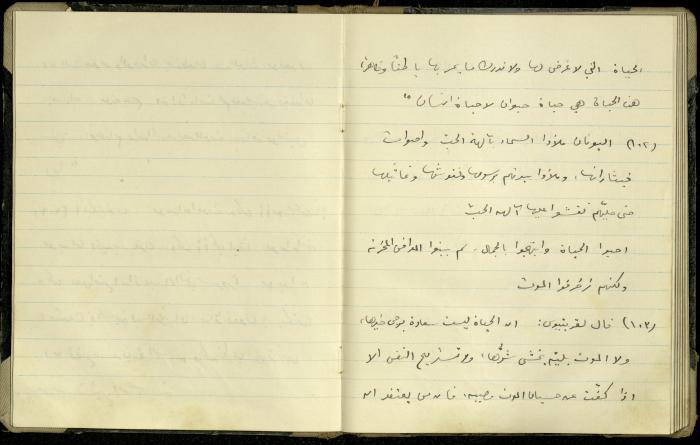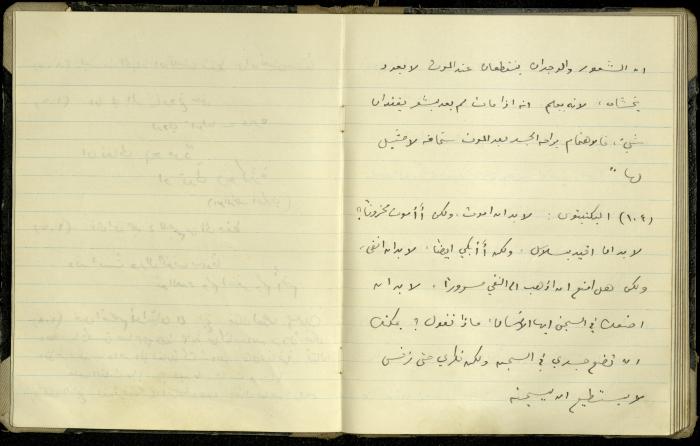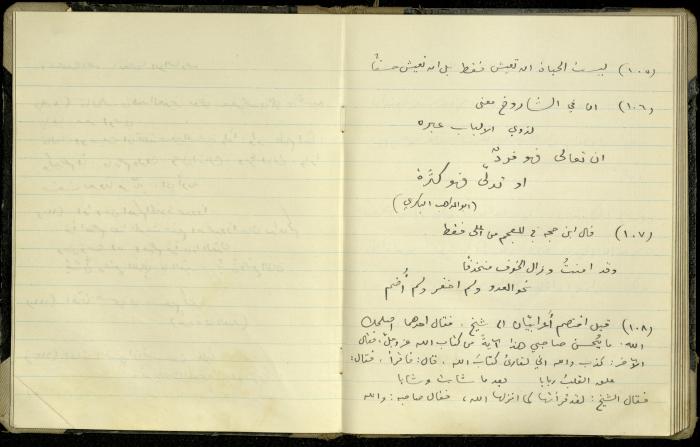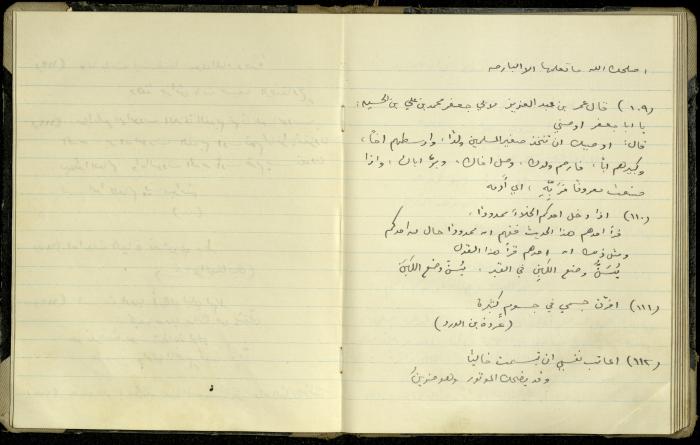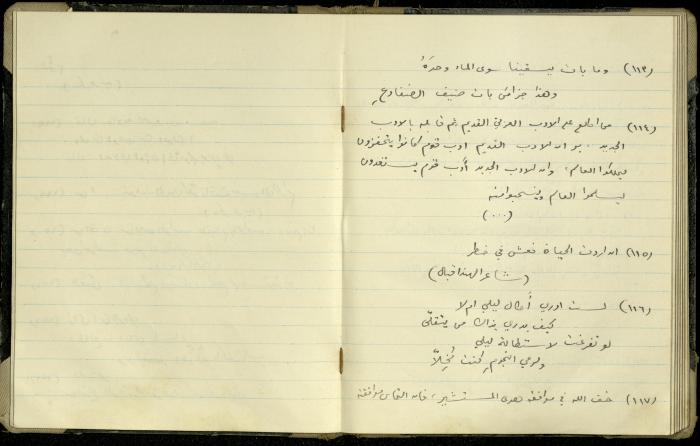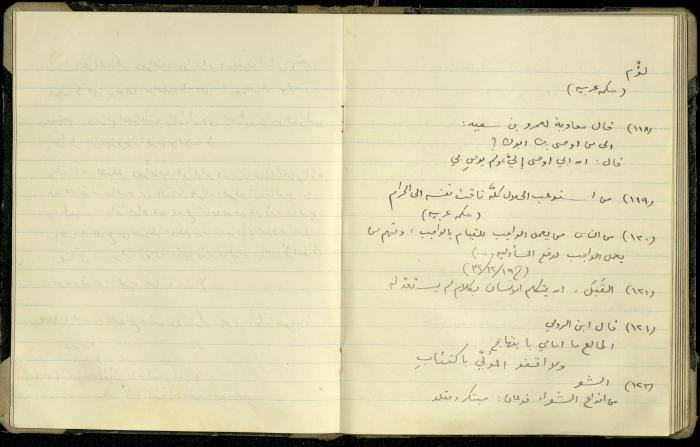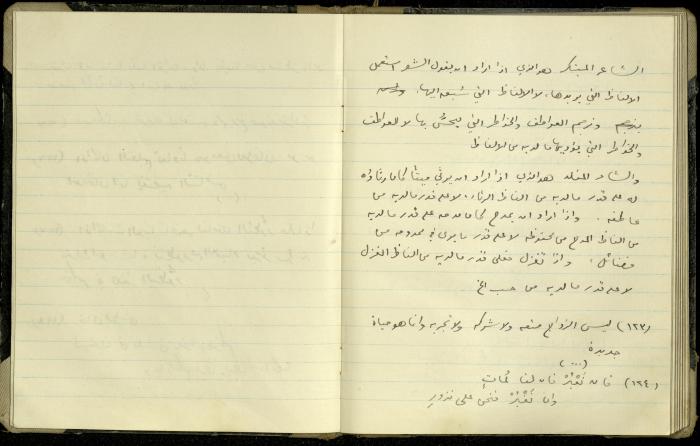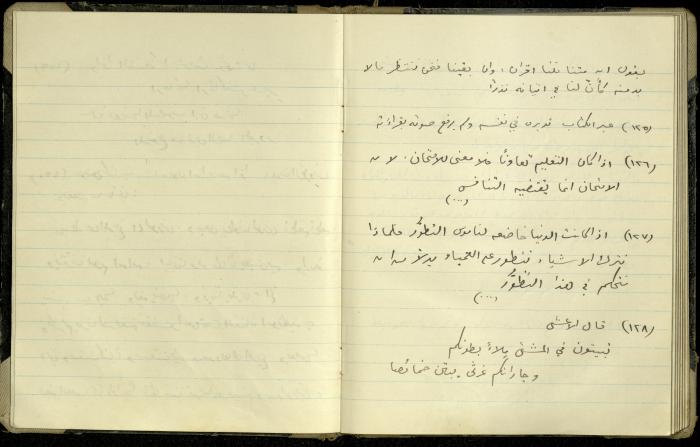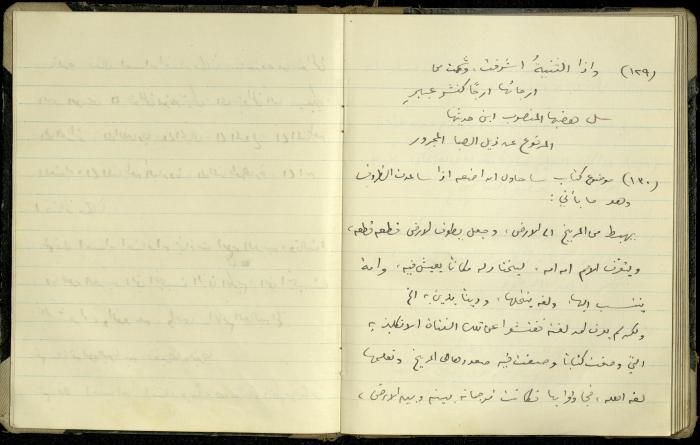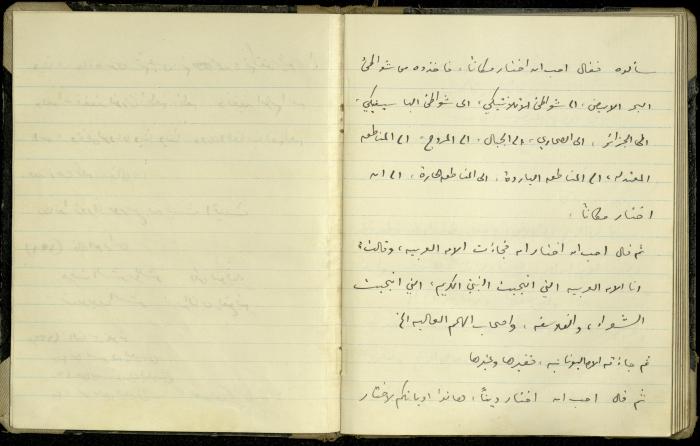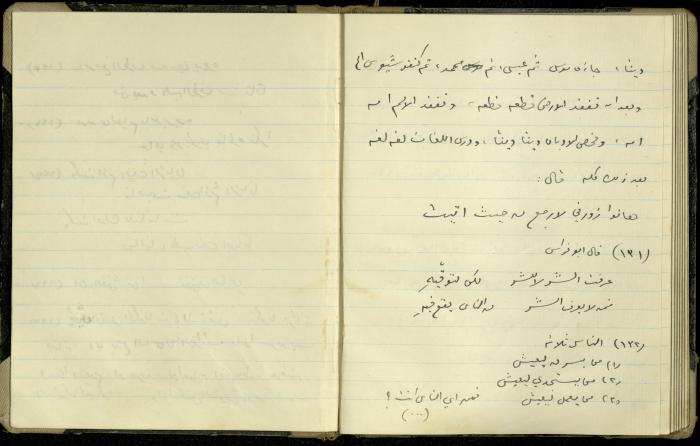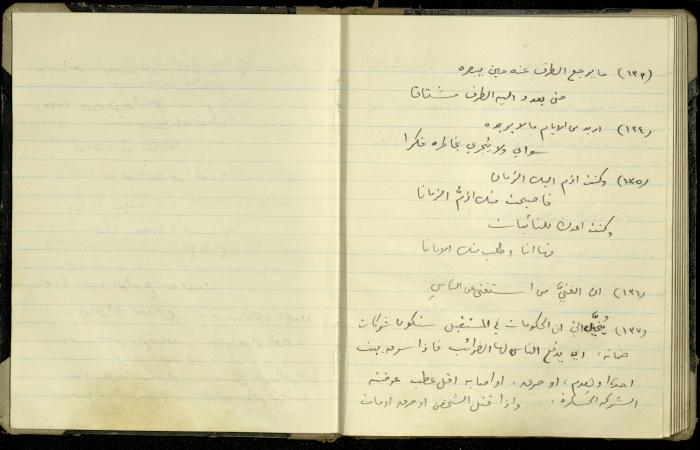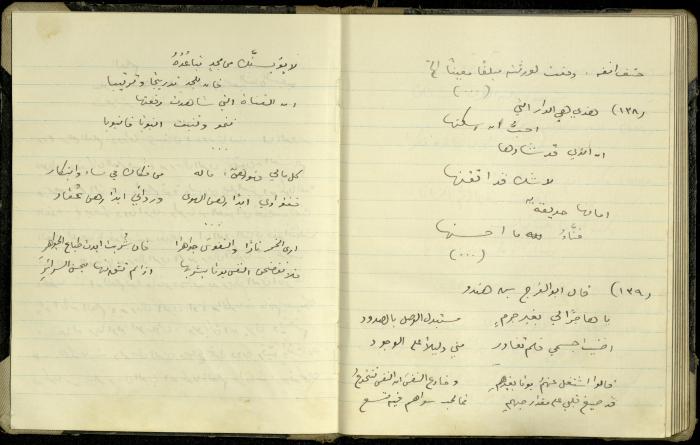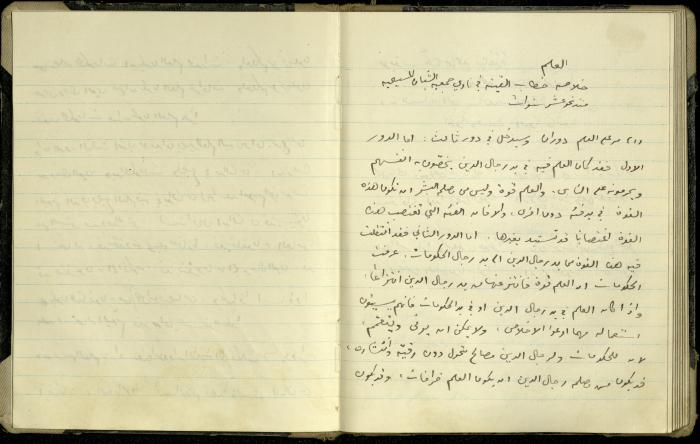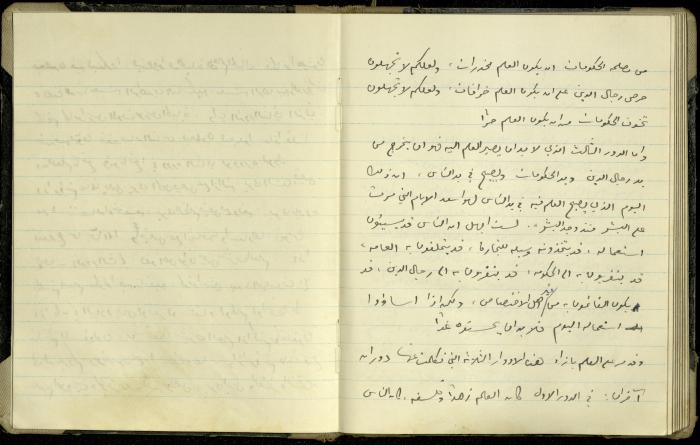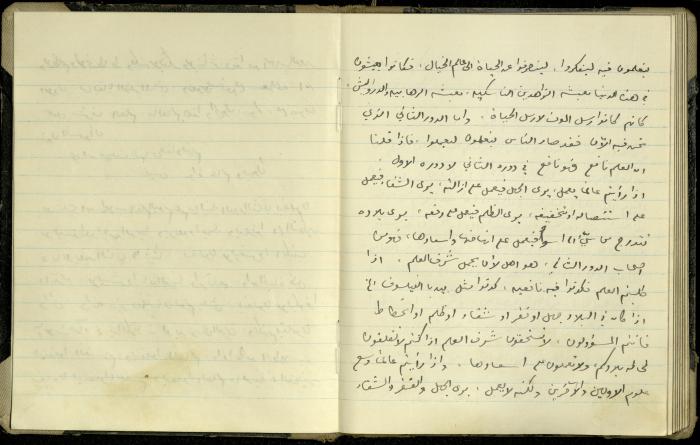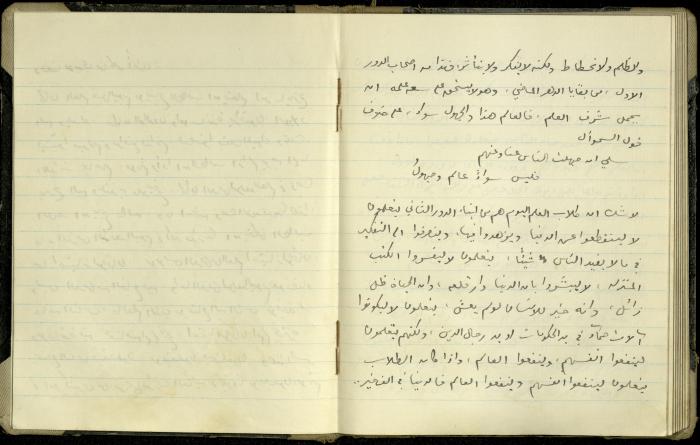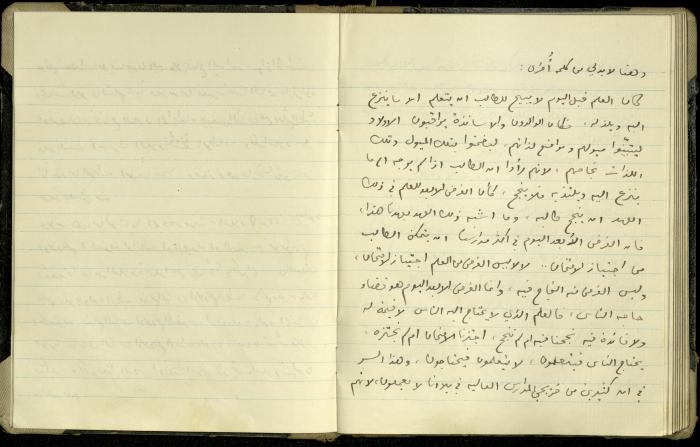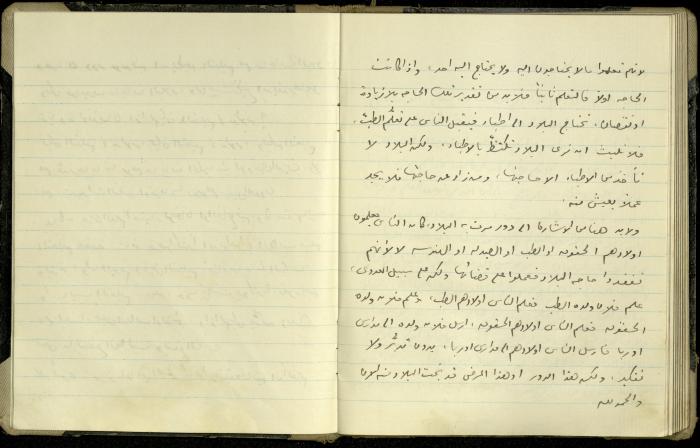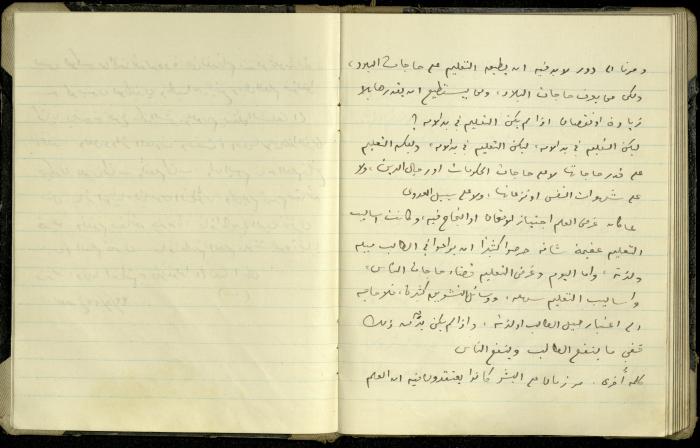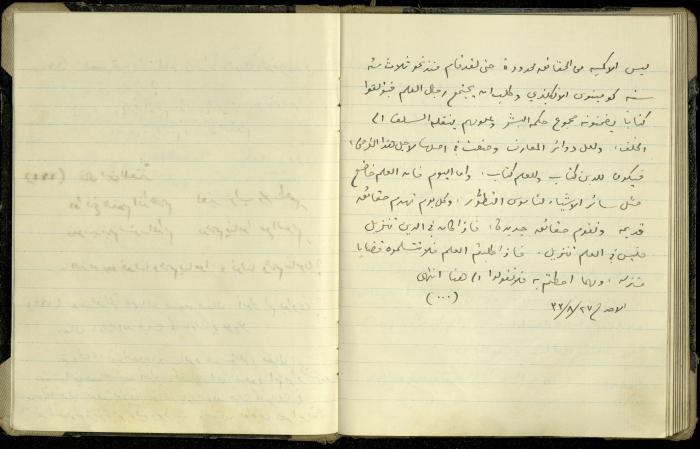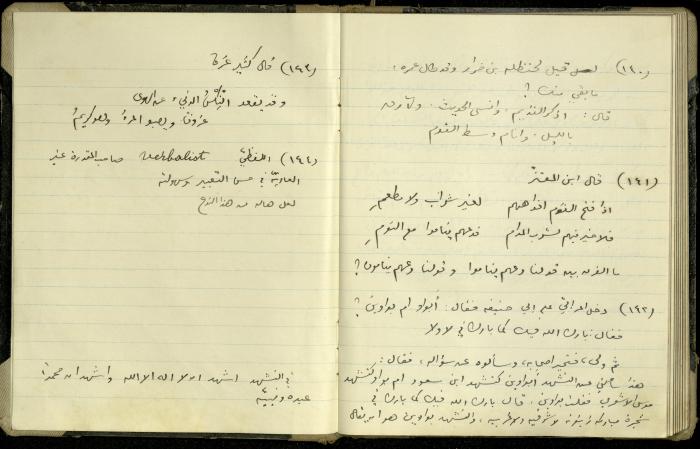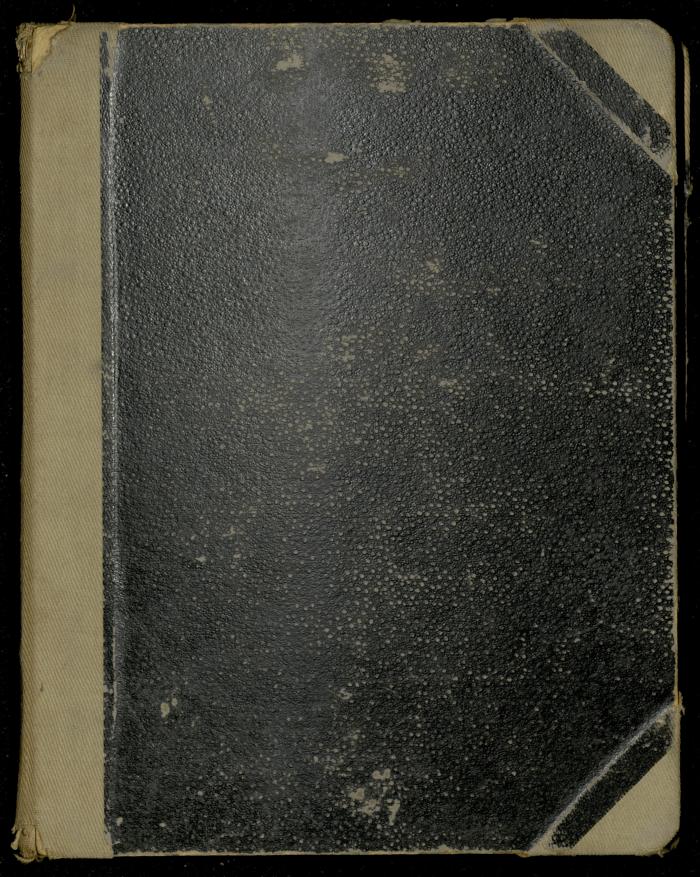A Book by Khalil Sakakini
This is a handwritten copy of an untitled book by Khalil Sakakini that included various major themes such as education, metaphysics, music, philosophical reflections, poetic anthologies, women, sophistication, thoughts, Arab and international advice and quotes and science. Sakakini establishes in his topic related to education and upbringing that man proceeds in acquiring knowledge from the near to the distant, from the known to the unknown, from the tangible to the moral and from the easy to the difficult, that man was interested in the metaphysical before his interest in nature; for the sky before the earth, for the dead before the living and the laws before medicine. It is mentioned in this context that God passed in two cycles; in the first, people were afraid of him, and in the second, they became afraid for him. He believes that he will enter a third role, where people are not afraid of or for him. He praises America's experience in establishing a chain of public primary schools across Asia. To raise the standard of living, it is necessary to teach child care, improve homes, public health, improve streets in villages, combat malaria that destroys people's activity, and teach personal hygiene. In the view of Sakakini, the truth is measured by the amount of our benefit from it, as he points out that some people can only think while they speak, and some of them are the exact opposite. He points out that those in charge of education must have received a wise upbringing and a free culture in order to imprint children with their manners. Sakakini does not recognize his feelings except to the extent of his connection to the truth; If he is separated from it, whether for pride, arrogance or lowliness, then it does not exist. Perjury is of three types; the first is that it is false, and the second that it is truthful, but not to support truth, but to satisfy lust or heal a feud and the third is that you can testify but do no. Then he indicates that man in the process of evolution is affected by the natural environment. He then records that his motto is "I bow down in chivalry, and I will not bow down in slavery". The concept of physical education among the Spartans was linked to the possibility of hardships, while in Athens it was a means of beautifying the body and improving its appearance. Nowadays, its purpose is healthy. Then Sakakini writes that education depends on two things. The first is that the teacher knows his subject and the second, that he knows how his students understand what he wants. A person's life depends on an idea, how a person's mind will be is what his life will be. Sakakini advises that if you want to learn a foreign language, choose a language that is higher than your nation's or its level, same as it is with literature, it is absurd that you, the son of the 20th century, chose the etiquette of the desert 1500 years ago. Then he refers to the fact that when people were divided into classes, the higher class differed from the lower class in everything, where peasant women were bright in colour, the women of the upper class were dyeing their faces differently from the peasant women, and while peasant women were well-built, the women of the upper class paid double lest they resemble peasant women, then he dwells more on the comparison. It is established that greatness is in the soul, not outside it, so if souls are devoid of greatness, they resort to replacing it with external things. Then he records that he had a role in which he was positive, and his motto was "I want". As for the time of writing this speech, he was in a negative role, and his motto was "I do not want." Then he spoke about his passing through his first period of life, in which he was very sensitive, impressionable, familiar and keen on his dignity and honour. But at the time of writing this document, he did not feel that anyone was violating his dignity or could denigrate him, as he does not care about looks or words. Then, at a later point, he compares a hadith by the Prophet with a Christian divine prayer, then is surprised by the Arabs asking each other about their condition, colour, dress and wellbeing, when they do not ask about thought. In the music section, Sakakini wonders if one is raptured by the piece of music itself or something outside of it. Sakakini believes that being raptured is not related to the musical piece, but in other considerations such as voice and playing, you may hear the same piece of music from two people, and you will enjoy one without the other. Also, if a piece is associated with memories, it makes it a place of rejoicing, mood also plays a role in the enjoyment. The psychology in which we are also plays an additional role and the place where we hear the piece. Then he moves on to talk about the types of sounds including flowing and resonant or with an echo and adapted sound. After that, he goes to the title "intermittent revelation", in which he broadcasts the titles of his thoughts such as his call to extinction, and despair for a mind is better than hope for absurdity, as there are no conditions for pleasure, slavery is almost an instinct, singing is joy, not demand, we do not have but we work. No thanks, no apologies, no blame or enrichment. In his opinion, the Tatrib for the later reciters of the Qur’an is that the reader sings and extends beyond the place of the Madd, and increases in the Madd what Arabic permits. Then, Sakakini gathers a group of separate poetic verses that reflect a different ruling. Sakakini believes that one of the purposes of having someone present the sermon to an audience is to make him known to them and to make them known to him if he is a stranger. Including preparing the audience to listen and the speaker to speak, he also conveys words by Amin al-Rayhan, in which he establishes that the East has philosophies and religions that are not sold by cannons and aeroplanes. It is not a question of buying and selling; rather, it is a question of roles; philosophies and religions have a role, and cannons and aeroplanes have another role. So is the revolution, there is a revolution against religion, governments, aristocracy, customs and lastly, the human’s revolution against himself. Then he recites poetry verses from Buhturi, Abu Tammam, al-Hati’a and Ibn al-Rumi. According to Sakakini, the woman has passed three turns and is about to enter a fourth. In the first round she was despised, in the second she was a place of pity for a man, in the third she became a place of respect for a man for two things; the first is because he has advanced in his manners and the second is because the woman has risen a little from what she was and in the fourth, the woman must be equal to the man. As for the fifth role, the woman will excel over the man, then either she will progress with him from respect to pity to contempt, so she will treat him the same way he treated her, and this is what Sakakini fears, or she will be more generous than him, with good treatment and compassion for him, and this is what he hopes. Regarding sophistication, Sakakini divides scientific research into three sections; a search for what, how and the purpose, scholars differed in the search for purpose, where some said that it is sterile and some said that the purpose of human existence is advancement. Here; humans go through three roles. First, the role of the conflict of survival; this role extended for a long time, and assumed the character of a conflict between man and nature; man was ignorant of the laws of nature, so it killed him almost to the point of extinction, just as many animals became extinct. Then there is a conflict between man and animals, then a conflict between man and man. Man has cut short this role in constant fear, constant strife, constant hunger, constant hatred and constant vigilance. This role has advantages and disadvantages, as for the advantages, man became accustomed to relying on himself and gaining courage, it also taught him patience, fortitude and resourcefulness. As for the disadvantages, it taught man cruelty, hatred, anger, gluttony and aggression. Second, it was the withdrawal from life, as the person became tired of conflict. In Sakakini's opinion, the weak ones were the first to withdraw, then the infection spread to everyone, even the strong. And the East is the first to fight the battles of the conflict, for it is the first to realize fatigue, and it still prefers to withdraw from life. Third, it is a new role in which man returned to life, and the first era of interest in life in it was mixing with Westerners, where we wished to be like them. After that, the trend of the world turned towards advancement. Sakakini then records quotes from Bernard Shaw, Oscar Wild, Voltz the German and al-Hallaj. Then he records his meditations in a letter to his son Sari, titled “Let’s Speak Philosophy” dated 15 April 1932, where he examines the faces of the passers-by and examines them, finding only misery. He mentions what hurts him, it hurts him to see misery, to be happy and miserable for others and to be able to change or alleviate this misery and not doing so. However, he finds optimism for the coming of a time when people will not tolerate witchcraft or tyranny, and only the righteous and good people will survive. Then he records his views on reducing birth. In the Egyptian newspaper Kawkab Al Sharq, in the issue published on 13 April 1932, he found Walter Ansemann's article titled "Preference for Small Families", in which he talks about the modern family, which is characterized by a small house, garage and number of family members, and that the small family became what people want. In a section titled "Khawatir", Sakakini records the roles he went through, a role in which he was direct and a role in which he became the opposite. Moreover, weakness is a disgrace to him, nature is not blind, the weak may pass through life honest and honourable, but they will not excel in anything and cannot rise above the level of the crowd. He puts forward his opinion that in the city personalities differ after deciding the similarity of people in the innate machine. In the new world, almost every human being is a species of his own. Then he records a thought about love; and he has a genius of art and poetry, to which every nature does not transcend, and its beauty is not enjoyed by everyone who talks about it. He quotes from al-Akkad that experience alone is sufficient to convince us that imperfection is our affliction, not death, and that perfection is our goal, not survival. He writes of the child as a noisy, agitated and inquisitive animal; and if we confronted them and tried to tame them, we are worse than them in the eyes of Sakakini. In another meditation written by Sakakini, he sees that the secret to success is to want what you are capable of doing and to be able to do what you want. In the struggle for survival, it is not the most appropriate who lives, but he who can adapt himself to the requirements of circumstances. Then Sakakini records quotes from international poets and writers. Speaking of poetry, Sakakini records two types of poetry; innovative and imitative. The inventive poet is the one who uses the words he wants, not words previously mentioned and translates the emotions and thoughts that he feels, not those that are guaranteed by his words. The imitator poet is on the contrary. At the end of the book, Sakakini records a summary of a speech he gave at the YMCA club on science. In his opinion, science has passed two turns and will enter a third. In the first turn, knowledge was in the hands of the clergy, who singled out themselves for it and denied it to the people. Science is power, and it is not in the interest of mankind that this power is in the hands of one group over another in order to avoid tyranny. As for the second turn, this power was transferred from the hands of the clergy to the hands of the government, after the latter learned that knowledge is power, so it wrestled it from the hands of the clergy. In the third turn, it is to get out of the hands of the clergy and the government and become in the hands of the people. Moreover, science was asceticism and philosophy; it was a place where people drifted from life to the realm of imagination, now it became learning for action.
Date created
COLLECTIONS
Tags
Topics
TYPE
LOCATION
More details
Format
Source of Description
عبدات، لجين وسمرعزريل. "مركز خليل السكاكيني الثقافي". جرد أرشيفي. 25 آب 2020. أرشيف المتحف الفلسطيني الرقمي.
Physical status
medium
Help us refine the information, suggest a change in the content of this item
Suggest a Change
